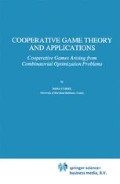Abstract
Vladimir, Wanda, and Xavier each has a house that he/she wants to sell. Yolanda and Zarik each wants to buy a house. Vladimir values his house at $100,000, Wanda values her house at $150,000, and Xavier values his house at $200,000. Vladimir’s house is worth $80,000 to Yolanda and $150,000 to Zarik, Wanda’s house is worth $200,000 to Yolanda and $120,000 to Zarik, and Xavier’s house is worth $220,000 to Yolanda and $230,000 to Zarik. For the sake of notational shortness, we will divide all numbers by 100,000 in the following discussion. If Vladimir and Yolanda get together they will not be able to reach an agreement since Vladimir values his house at more than it is worth to Yolanda. If Vladimir and Zarik get together they can generate a profit of 1.5−1=0.5. If Wanda and Yolanda get together they can generate a profit of 2−1.5=0.5. If Wanda and Zarik get together they will not be able to reach an agreement since Wanda values her house at more than it is worth to Zarik. If Xavier and Yolanda get together then they can generate a profit of 2.2−2=0.2. If Xavier and Zarik get together then they can generate a profit of 2.3−2=0.3. If they cooperate in coalitions of more than two persons then the matching(s) between the owner of a house and a buyer that generate the most profit has to be found for each coalition. It is clear that coalitions that contain only sellers or only buyers will not generate any profit. In table 3.1, where the cooperative game arising from this situation is given, these coalitions have been left out.
Access this chapter
Tax calculation will be finalised at checkout
Purchases are for personal use only
Preview
Unable to display preview. Download preview PDF.
Author information
Authors and Affiliations
Rights and permissions
Copyright information
© 1997 Springer Science+Business Media Dordrecht
About this chapter
Cite this chapter
Curiel, I. (1997). Assignment Games and Permutation Games. In: Cooperative Game Theory and Applications. Theory and Decision Library, vol 16. Springer, Boston, MA. https://doi.org/10.1007/978-1-4757-4871-0_3
Download citation
DOI: https://doi.org/10.1007/978-1-4757-4871-0_3
Publisher Name: Springer, Boston, MA
Print ISBN: 978-1-4419-4775-8
Online ISBN: 978-1-4757-4871-0
eBook Packages: Springer Book Archive

